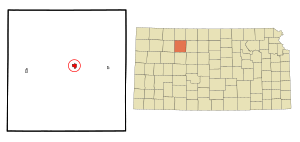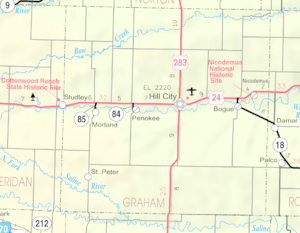Hill City, Kansas facts for kids
Quick facts for kids
Hill City, Kansas
|
|
|---|---|
|
City and County seat
|
|

Location within Graham County and Kansas
|
|

|
|
| Country | United States |
| State | Kansas |
| County | Graham |
| Founded | 1876 |
| Platted | 1878 |
| Incorporated | 1888 |
| Named for | W.R. Hill |
| Area | |
| • Total | 1.00 sq mi (2.60 km2) |
| • Land | 1.00 sq mi (2.60 km2) |
| • Water | 0.00 sq mi (0.00 km2) |
| Elevation | 2,185 ft (666 m) |
| Population
(2020)
|
|
| • Total | 1,403 |
| • Density | 1,403/sq mi (539.6/km2) |
| Time zone | UTC-6 (CST) |
| • Summer (DST) | UTC-5 (CDT) |
| ZIP code |
67642
|
| Area code | 785 |
| FIPS code | 20-32175 |
| GNIS ID | 2394380 |
Hill City is a city in Graham County, Kansas, in the United States. It's also the county seat, which means it's the main town where the county government is located. In 2020, about 1,403 people lived there.
Contents
A Look Back at Hill City's History
Hill City was first settled in 1876, making it the oldest town in Graham County. It was named after one of the first settlers, W. R. Hill. The town was officially planned out in 1878.
The first post office in Hill City opened in September 1878. Hill City became the county seat in 1880. By 1915, the town had 647 people living there.
Geography and Climate
Hill City covers an area of about 1 square mile (2.6 square kilometers), and all of it is land.
Weather in Hill City
Hill City has experienced some strong weather events. On June 9, 2005, a large tornado passed just south of the city. Another big tornado hit north of the city on June 20, 2011.
The town has also seen very hot temperatures. On June 26, 2012, the temperature reached 115°F (46°C). This broke a record that was tied just two days earlier and also during the Dust Bowl in 1933. For four days in a row, Hill City was the hottest city in the United States.
| Climate data for Hill City, Kansas, 1991–2020 normals, extremes 1907–present | |||||||||||||
|---|---|---|---|---|---|---|---|---|---|---|---|---|---|
| Month | Jan | Feb | Mar | Apr | May | Jun | Jul | Aug | Sep | Oct | Nov | Dec | Year |
| Record high °F (°C) | 83 (28) |
86 (30) |
94 (34) |
100 (38) |
105 (41) |
115 (46) |
117 (47) |
115 (46) |
112 (44) |
101 (38) |
87 (31) |
83 (28) |
117 (47) |
| Mean maximum °F (°C) | 68.1 (20.1) |
73.2 (22.9) |
81.3 (27.4) |
88.5 (31.4) |
95.3 (35.2) |
103.8 (39.9) |
105.7 (40.9) |
102.9 (39.4) |
99.7 (37.6) |
90.5 (32.5) |
78.8 (26.0) |
66.4 (19.1) |
106.9 (41.6) |
| Mean daily maximum °F (°C) | 41.2 (5.1) |
44.9 (7.2) |
55.9 (13.3) |
64.8 (18.2) |
74.2 (23.4) |
85.7 (29.8) |
91.0 (32.8) |
88.6 (31.4) |
80.8 (27.1) |
67.8 (19.9) |
54.2 (12.3) |
42.7 (5.9) |
66.0 (18.9) |
| Daily mean °F (°C) | 28.7 (−1.8) |
31.5 (−0.3) |
41.4 (5.2) |
50.6 (10.3) |
61.1 (16.2) |
72.4 (22.4) |
78.0 (25.6) |
75.5 (24.2) |
66.8 (19.3) |
53.2 (11.8) |
40.2 (4.6) |
30.2 (−1.0) |
52.5 (11.4) |
| Mean daily minimum °F (°C) | 16.2 (−8.8) |
18.0 (−7.8) |
26.8 (−2.9) |
36.3 (2.4) |
48.0 (8.9) |
59.1 (15.1) |
64.9 (18.3) |
62.4 (16.9) |
52.7 (11.5) |
38.5 (3.6) |
26.2 (−3.2) |
17.6 (−8.0) |
38.9 (3.8) |
| Mean minimum °F (°C) | −0.8 (−18.2) |
1.5 (−16.9) |
10.2 (−12.1) |
21.6 (−5.8) |
33.9 (1.1) |
46.9 (8.3) |
54.6 (12.6) |
52.5 (11.4) |
38.9 (3.8) |
22.3 (−5.4) |
11.1 (−11.6) |
0.7 (−17.4) |
−6.2 (−21.2) |
| Record low °F (°C) | −24 (−31) |
−23 (−31) |
−20 (−29) |
4 (−16) |
22 (−6) |
33 (1) |
44 (7) |
39 (4) |
19 (−7) |
3 (−16) |
−11 (−24) |
−19 (−28) |
−24 (−31) |
| Average precipitation inches (mm) | 0.51 (13) |
0.71 (18) |
1.25 (32) |
1.98 (50) |
3.73 (95) |
2.96 (75) |
4.12 (105) |
3.33 (85) |
2.19 (56) |
1.80 (46) |
0.83 (21) |
0.75 (19) |
24.16 (615) |
| Average snowfall inches (cm) | 3.3 (8.4) |
5.5 (14) |
2.1 (5.3) |
0.3 (0.76) |
0.2 (0.51) |
0.0 (0.0) |
0.0 (0.0) |
0.0 (0.0) |
0.0 (0.0) |
0.7 (1.8) |
1.5 (3.8) |
3.8 (9.7) |
17.4 (44.27) |
| Average precipitation days (≥ 0.01 in) | 2.7 | 3.7 | 4.9 | 7.1 | 9.3 | 8.5 | 7.8 | 7.7 | 5.5 | 6.0 | 4.0 | 3.2 | 70.4 |
| Average snowy days (≥ 0.1 in) | 1.6 | 1.9 | 0.9 | 0.2 | 0.0 | 0.0 | 0.0 | 0.0 | 0.0 | 0.2 | 0.8 | 1.7 | 7.3 |
| Source: NOAA | |||||||||||||
People of Hill City
| Historical population | |||
|---|---|---|---|
| Census | Pop. | %± | |
| 1890 | 545 | — | |
| 1900 | 468 | −14.1% | |
| 1910 | 983 | 110.0% | |
| 1920 | 732 | −25.5% | |
| 1930 | 1,027 | 40.3% | |
| 1940 | 1,115 | 8.6% | |
| 1950 | 1,432 | 28.4% | |
| 1960 | 2,421 | 69.1% | |
| 1970 | 2,071 | −14.5% | |
| 1980 | 2,028 | −2.1% | |
| 1990 | 1,835 | −9.5% | |
| 2000 | 1,604 | −12.6% | |
| 2010 | 1,474 | −8.1% | |
| 2020 | 1,403 | −4.8% | |
| U.S. Decennial Census | |||
Population in 2020
The 2020 United States census counted 1,403 people living in Hill City. There were 625 households and 359 families. Most of the people (92.3%) were white. About 2.0% were Black or African American, and 0.43% were Native American. About 0.93% were Asian. A small number of people (3.92%) were from two or more races. About 2.92% of the population was Hispanic or Latino.
In terms of age, 22.1% of the people were under 18 years old. About 27.7% were 65 years or older. The average age in Hill City was 47.6 years.
Population in 2010
In 2010, there were 1,474 people living in Hill City. There were 669 households and 404 families. The majority of residents (91.2%) were White. About 4.5% were African American, and 0.8% were Native American.
The average age in the city was 48 years. About 20.8% of residents were under 18 years old. About 23.9% were 65 years or older.
Education
The public schools in Hill City are part of the Graham County USD 281 school district. Both the elementary school and the junior/senior high school are located in Hill City. The district used to be known as Hill City USD 281.
Famous People from Hill City
- Charles V. Park (1885–1982) — He was a well-known librarian. A library at Central Michigan University, called the Charles V. Park Library, is named after him. He was born in Hill City.
See also
 In Spanish: Hill City (Kansas) para niños
In Spanish: Hill City (Kansas) para niños
 | Anna J. Cooper |
 | Mary McLeod Bethune |
 | Lillie Mae Bradford |

